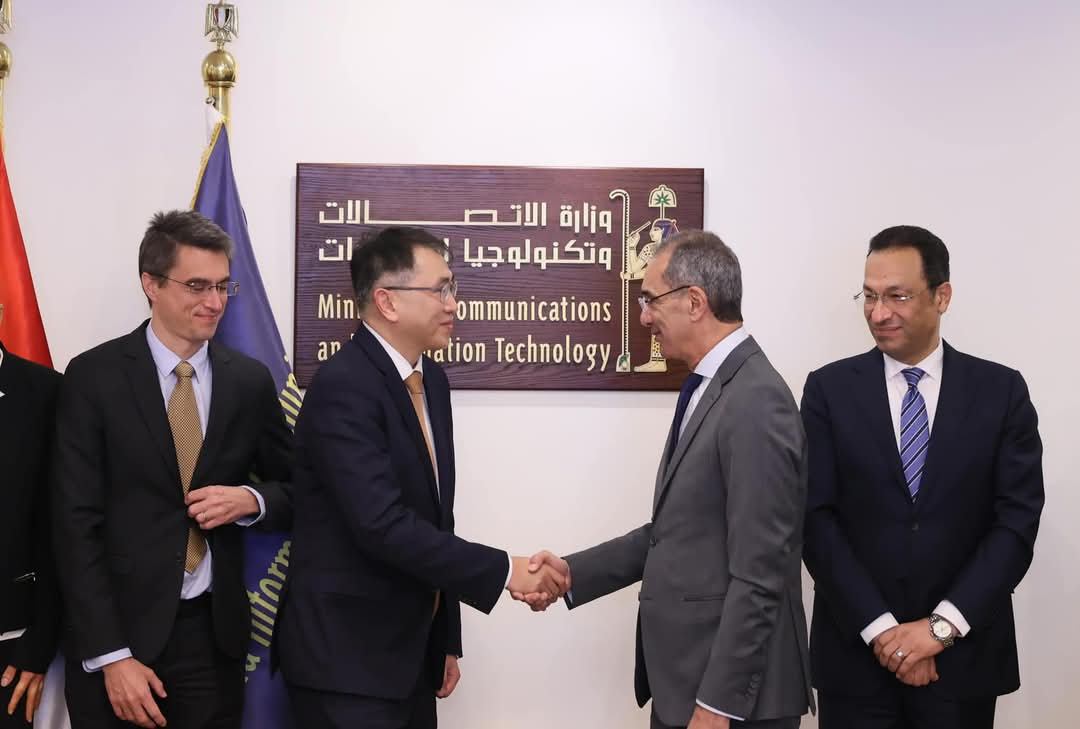The Minister of Communications and Information Technology Amr Talaat has met with the Vice President for Digital Transformation at World Bank Sangbu Kim and his accompanying delegation. They discussed strengthening future cooperation in advancing digital transformation, developing digital infrastructure, raising digital awareness, and fostering digital skill development.
The meeting is part of Kim’s visit to Egypt on December 17-19 to explore closely Egypt’s efforts in digital transformation and data centers and discuss supporting the ongoing cooperation between the Egyptian ICT sector and the World Bank.
During the meeting, the ICT Minister outlined ongoing efforts to achieve the objectives of the Digital Egypt strategy. These efforts involve driving digital transformation to optimize the performance of various sectors through technology integration, digitizing government services, advancing human development, preparing youth for future jobs, and supporting tech innovation and entrepreneurship. He emphasized that numerous mechanisms are adopted to boost citizen engagement with digital platforms.
Furthermore, Talaat referred to the main enablers of the Digital Egypt strategy, including establishing a legislative framework to govern the ICT sector. Current efforts encompass drafting an Artificial Intelligence (AI) law and another law focused on data classification and exchange, Talaat noted. He pointed out that projects are implemented to develop digital infrastructure through the nationwide expansion of fiber-optic cables and the replacement of copper cables with fiber-optic ones.
The ICT Minister reviewed the projects carried out by the Ministry of Communications and Information Technology (MCIT) in the villages targeted within the Decent Life initiative. These projects aim to deliver high-speed Internet to villagers, develop postal services, and establish and upgrade cell towers to enhance telecom coverage and services. Moreover, he highlighted the implementation of programs designed to promote digital literacy and raise digital awareness. Talaat also pointed to the ongoing collaboration between MCIT and the World Bank in areas of digital transformation and digital infrastructure development.
For his part, Kim commended the Egyptian experience in transitioning into an all-encompassing digital society according to a comprehensive and specific approach within the Digital Egypt strategy. The strategy incorporates an integrated digital system across key pillars, including delivering digital services, enhancing data governance, building capacities, preparing youth for employment opportunities, and supporting entrepreneurship. He highlighted that the strategy aligns with the World Bank’s approach, which sets specific criteria to help countries bridge the technological divide.
Kim also outlined the main programs implemented in data protection, cybersecurity, and AI. He looked forward to expanding collaboration with the Egyptian government to advance digital transformation efforts, particularly in Decent Life villages. He also underlined the value of leveraging Egypt’s digital transformation experience and sharing knowledge and expertise with other countries.
The Global Lead for Business Regulation in the Finance, Competitiveness, and Innovation Practice of the World Bank Group Sylvia Solf underscored that the World Bank has identified several key priorities, including providing technical assistance and support for programs and projects focused on accelerating digitization, delivering impactful digital services, promoting green transformation, and developing data centers.
The meeting explored avenues to strengthen cooperation in advancing digital infrastructure, including developing submarine cables and data centers. It delved into the expansion of Internet services across the country, with a focus on the villages covered by the national project for developing the Egyptian countryside, Decent Life. The aim is to promote digital inclusion and ensure access to high-impact, widely available digital government services among citizens while helping young people secure employment opportunities online.
Additionally, the meeting highlighted the progress achieved through collaboration between MCIT and the World Bank in enhancing data governance and developing an integrated Real Estate Wealth Management System (REWMS) under the World Bank’s Egypt Digitalization Programmatic Technical Assistance program.
The meeting was attended by MCIT representatives, including the Vice ICT Minister for Infrastructure and Digital Transformation Raafat Hindy, Assistant ICT Minister for Strategy and Implementation Sherine El-Guindy, Advisor to the ICT Minister on Digital Transformation Mahmoud Badawi, the Advisor to the ICT Minister for International Relations Affairs Khaled Taha, and Director of the Central Department of International Relations Samah Aziz.
From the World Bank, the meeting was joined by the Country Director for Egypt, Yemen, and Djibouti Stephane Guimbert; Senior Digital Development Specialist Zaki Khoury; Program Leader, Infrastructure for Egypt, Djibouti, and Yemen Affouda Léon Biaou; and Senior Executive Assistant Dalia Shehata.


